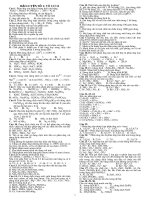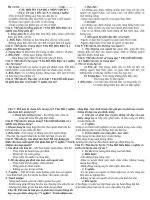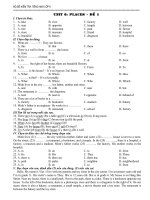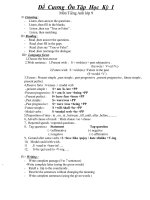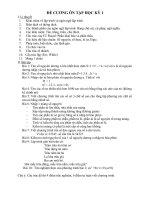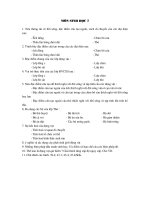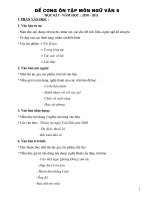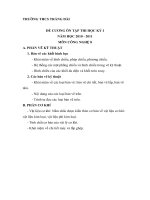- Trang chủ >>
- THPT Quốc Gia >>
- Sinh học
on tap HK 1
Bạn đang xem bản rút gọn của tài liệu. Xem và tải ngay bản đầy đủ của tài liệu tại đây (198.11 KB, 4 trang )
<span class='text_page_counter'>(1)</span>A: “ Tenses’’ and “wish” I.EXERCISE 1-Choose the best word/words in brackets 1. My friend.........................to the museum last weekend. (goes, went, had gone) 2. My grandfather.............................many years ago. (dies, died, has died, was dying) 3. I.......................my son the money for that last week. (gave, given, have given, was given) 4. The earth.........................around the sun. (go, went, has gone, goes) 5. He ...............................her walk through the park two hours ago. (sees, saw / has seen) 2-Choose the best word/words in brackets 1. My friend .....................to the museum now. (goes, went, is going) 2. My grandfather ..........................TV at the moment. (watches/ is watching/ was watching) 3. Tom was taking a photograph of me while I ................ (don’t look/ isn’t looking/ wasn’t looking). 4. I .......................... soccer at that time. (am playing/ was playing/play) 5. Look! It’s ......................... (is snowing/ was snowing / snows). 3-Give the correct form of the verbs in the blankets: 1. He ................... (paint) the ceiling at the moment. 2. Last night I ................... read in bed when suddenly I heard a scream. 3. ............... ....................... (You/watch) television when I phoned you? 4. Ann ................... (wait) for me when I arrived. 5. I ................... (not/drive) very fast when the accident happened. 4-Supply the correct tense form of the verbs in brackets 1. The children..............................................basketball now. (play) 2. She usually....................................dinner for the family. (cook) 3. The boys...................................a play for their school show on T.V at the moment. (rehearse) 4. They................................their mother with the housework everyday. (help) 5. There.....................a traffic jam in the center of the city almost every day since last year. (be) ii.Cách dùng của động từ “wish” Động từ “wish” (ớc ao, mong ớc) thờng đợc dùng để diễn tả những ớc muốn, những điều không có thật hoặc rất khã thùc hiÖn. 1.Future wish: (íc muèn ë t¬ng lai) CÊu tróc: S + wish(es) + S + Would + V VÝ dô: I wish I would go to the moon tomorrow. My mother wishes she would visit London some day. 2.Present wish: (íc muèn ë hÖn t¹i) Cấu trúc: S + wish(es) + S + V (động từ to be chia were/ động từ thờng chia quá khứ) VÝ dô: I wish I were at the seaside now. He wiskes he could speak English fluently. Complete these sentences: 1. I wish I (can) speak English perfectly. I wish……….....…………..………….....….…………………… 2. I wish I (can) do this exercise. I wish……….....….………….....….………………………… 3. I wish I (know) how to swim. I wish……….....………….….....………..……………………… 4. I wish the weather (be) better today. I wish……….....…………..………….....….…………………… 5. I wish I (not have to) work on Saturday. I wish……….....…………..………….....….…………………… 6. I wish you (not come) here late. I wish……….....…………..…………...….……………………… ---------------------------------------------------------------------------------------------------------------------B: câu bị động I. Các bớc chuyển một câu chủ động sang một câu bị động: - Xác định chủ ngữ, động từ , tân ngữ và thì của câu chủ động - Chuyển tân ngữ của câu chủ động sang làm chủ ngữ của câu bị động chñ ng÷ t©n ng÷ I me you you he him she he it it we us they them -Viết động từ "to be" ở thì câu chủ động - Chuyển động từ ở câu chủ động sang dạng P2 ở câu bị động -ViÕt tiÕp c¸c thµnh phÇn kh¸c nÕu cã -Viết "by" rồi chuyển chủ ngữ của câu chủ động sang làm tân ngữ cho câu bị động ex: Nguyen Du wrote Kieu story many years ago S V O - Kieu story was written by Nguyen Du II. Các dạng câu bị động cụ thể 1. Bị động ở thì hiện tại đơn A: S + V (s/es) + O + ........... 3. Bị động ở thì hiện tại hoàn thành A: S + have/ has + P2 +...........
<span class='text_page_counter'>(2)</span> P: S(o) + is/ am/ are + P2 (v) +.... + (by O) ex: people speak English all over the world S V O - English is spoken all over the world. P: S (o) + been + P2 + ..... + (by O) ex: Lan has invited them to the party already S P2 O - They have been invited to the party already by Lan. 2. Bị động ở thì quá khứ đơn A: S + V-qk + O +......... P: S (o) + was/ were + P2(v) +.....+ (by O ) ex: Some one stole my car last night S V O - My car was stolen last night. 4. Bị động ở thì tơng lai đơn A: S+ will/ shall + V + O +...... P: S(O) + will/ shall + be + P2 (v) +..... +(by O ) ex: I will give them my telephone number S V O - They will be given my telephone number by me. 1. Chuyển các câu sau sang câu bị động 1. Mary does some exercises everyday. ………………………………………………………………………………….. 2. My mother made a good cake. ……………………………………………………………………………………….. 3. Workers have repaired the roof of my school. ………………………………………………………………………….. 4. The new teacher teaches English. ………………………………………………………………………………………….. 5. They will build a new school next year. ……………………………………………………………………………………. 6. English people like football. ………………………………………………………………………………………………… 3-§äc kü ®o¹n v¨n sau råi tr¶ lêi c©u hái: Last June, David went to Ha Long bay for three weeks. He went by plane and he stayed in a big hotel. He took many photographs of caves. He visited many caves in Ha Long Bay and ate a lot of seafood. He enjoyed the holiday very much. 1.When did David go to Ha Long Bay?___________________________________________________ 2.How did he go there?___________________________________________________ 3.Where did he stay?___________________________________________________ 4.What did he take?__________________________________________________ 5.What did he visit in Ha Long?__________________________________________________ 6.Did he like the holiday?__________________________________________________ I have got two sisters, Linda and Betty, and two brothers, David and Jack. Linda is twenty. Betty is six years younger than Linda, but she is two years older than Jack. Jack is four years younger than me and he is eight years younger than David. 1.How old am I?_______________________________________________________ 2.Who is the youngest in my family?___________________________________________ 3.How old is Jack?________________________________________________________ 4.Is Betty older than me?________________________________________________________ 5.Who are the twins?________________________________________________________ Peter and Mary were talking about last night’s activities. Mary was at her cousin ’s birthday party. She was having a nice time there all the evening. Then Peter was practicing his music lesson at home. His sister was sewing a new dress for her doll. Peter’s parents were also staying at home while his father was playing chess , his mother was helping his sister. a-What were Peter and Mary talking about?___________________________________________________ b-Was Mary having a nice time there all the evening?___________________________________________ c.Who was sewing a new dress for her doll?__________________________________________________ d.What was Peter’s father doing while his mother was helping Susan? ______________________________________________________________ C: C©u trùc tiÕp –Gi¸n tiÕp *Những thay đổi khi chuyển từ câu trực tiếp sang câu gián tiếp :. §æi tõ chØ thêi gian, n¬i chèn: Trùc tiÕp Gi¸n tiÕp This That These Those Here There Now Then/ at one/ immediately. Ago Before Today That day Tonight That night Tomorrow The next/ following day. Yesterday The day before/ the previous day Last night/ week/ month/ year The night/ week/ month/ year before hoÆc the previous night ….. Next week/ month/ year The following week/ month/ year. *C¸c d¹ng c©u trùc tiÕp chuyÓn sang c©u gi¸n tiÕp: 1-D¹ng c©u trùc tiÕp lµ c©u ph¸t biÓu: *C¸ch chuyÓn: -LÆp l¹i tõ said/ say. -Bá ngoÆc kÐp, bá dÊu phÈy thay b»ng that. -Thay đổi thì, từ chỉ thời gian và nơi chốn, ngôi cho phù hợp với nghĩa của câu (nếu có) *C«ng thøc: Trùc tiÕp: S + said, “ S +V ” -->Gi¸n tiÕp: S + said + (that) S + V(lïi th×).
<span class='text_page_counter'>(3)</span> VD: Lan said: “I am a student”. -->Lan said (that) she was a student. 2-D¹ng c©u trùc tiÕp lµ c©u cÇu khiÕn, c©u mÖnh lÖnh: *C¸ch chuyÓn: -Đổi động từ say-->tell, said-->told, sau đó thêm tân ngữ vào sau nó. -Bá dÊu phÈy, dÊu ngoÆc kÐp, dÊu chÊm than, tõ please (nÕu cã). -Đổi đại từ nhân xng, tính từ sở hữu, trạng từ chỉ thời gian, nơi chốn (nếu cần thiết) *C«ng thøc: +Khẳng định: Trùc tiÕp: S + say/ said, “V…” -->Gi¸n tiÕp: S + tell/ told + O + to + V……. VD: She said, “Close the books, please!” -->She told the students to close the books. +Phủ định:. Trùc tiÕp: S + say/ said, “Don’t + V…” -->Gi¸n tiÕp: S + tell/ told + O + not + to + V…….. VD: She said, “Don’t sit down!” -->She told me not to sit down 3.Dạng câu trực tiếp là câu hỏi đảo (Yes/ No- questions) *C¸ch chuyÓn: -Đổi said-->asked (hoặc wanted to know/ wondered) sau đó thêm tân ngữ (nếu cần thiết). -Bá dÊu ngoÆc kÐp, dÊu phÈy vµ dÊu hái. -Đặt If/ whether lên trớc chủ ngữ của câu gián tiếp +động từ lùi thì. -Đổi ngôi, đổi từ chỉ thời gian và nơi chốn(nếu cần thiết). *C«ng thøc:. Trùc tiÕp: Do/ Does/ Did + S + V-nd….? -->Gi¸n tiÕp: S + asked + O + if/ whether + S + V-lïi th×…. VD:. “Do you go to school?” he said. -->He asked me whether/ if I went to school. 4-Dạng câu trực tiếp là câu hỏi có từ để hỏi: (Wh-questions) *C¸ch chuyÓn: -Đổi said-->asked (hoặc wanted to know/ wondered) sau đó thêm tân ngữ (nếu cần thiết). -Bá dÊu ngoÆc kÐp, dÊu phÈy vµ dÊu hái. -Đặt từ hỏi wh lên trớc chủ ngữ của câu gián tiếp +động từ lùi thì. -Đổi ngôi, đổi từ chỉ thời gian và nơi chốn(nếu cần thiết). *C«ng thøc: Trùc tiÕp: Tõ hái + do/ does/ did + S + V-nd….? -->Gi¸n tiÕp: S + asked + O + tõ hái + S + V-lïi th×… VD: “Where do you live?” he said. -->He asked me where I lived. 5.Dạng động từ khuyết thiếu: Trùc tiÕp: Tõ hái + can/ shall/ will+ S + V-nd….? -->Gi¸n tiÕp: S + asked + O + Tõ hái + S + could/ should/ would + V-nd… VD:. Mary said to Nam, “How can you speak English?” -->Mary asked Nam how he could speak English. Note:Nếu câu hỏi với will/ shall…diễn tả yêu cầu, lời mời, đề nghị có thể chuyển sang câu gián tiếp dạng câu hỏi hoặc câu cÇu khiÕn. VD: He said, “Will you open the door?” -->He asked me to open the door. (He asked me If I would open the door) i- reported statements: 1. “ I’ll see you tomorrow’’ She said...... 2. “ I saw her today’’ She said...... 3. “I don’t like this film’’ She said...... 4. “ We went swimming today’’ She said...... 5. “ I’ll meet Mary on Sunday’’ She said....... II- reported yes – no questions. 1. “Do you want to buy any second – hand books?’’ Bill asked me………. 2. “Do you play any musical instruments?’’=> Lan asked me………….. 3. “Will you have time to play regularly? ’’=> Bill asked me…………. 4. “Do you play for your school team?’’ => Lan asked me………….. 5. “Can you speak any other languages?’’ He asked me...... III- Wh-questions: 1. “Why do you have to do this work?’’ He asked me...... 2. “What are you doing?” => He asked Lan…… 3. “What will you do when you leave school?” => Lan asked me………….. 4. “How did you know my name?” => He asked Lan……. 5. “Why didn’t you phone me?” => He asked Lan……. preposition of time I. Choose the suitable prepositions in brackets 1. Ba and Tam usually go fishing........................the weekends. (on, in, from, at) 2. The students will visit the capital.........................the summer. (on, in, at, of).
<span class='text_page_counter'>(4)</span> 3. They heard a very strange noise............................midnight. (on, in, at, out) 4. Our little brother took a long nap from 1p.m.........................4p.m. (till, up, between, at) 5. The competitions will take place..........................8a.m and 12a.m. (from, between, up to, to D : TAG QUESTION: CÂU HỎI ĐUÔI Có 2 hình thức 1) S+V (khẳng định), V(phủ định)+S? Ex: You play…, don’t you? He plays…, doesn’t he? She is a…., isn’t she? They will go…., won’t they? 2) S+V (phủ định), V(khẳng định)+S? Ex: You don’t play…, do you? He doesn’t play…, does he? She isn’t …., is she? They will not go…., will they? 1) You have heard about that,.....................? 2) Nam did the work well,.........................? 3) He didn’t have to speak to me,.....................? 4) He won’t fall down,.............................? 5) You wouldn’t like the window open,..................? 6) He used to beat his wife,............................?.
<span class='text_page_counter'>(5)</span>

